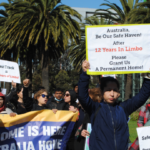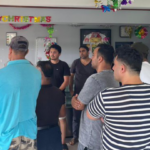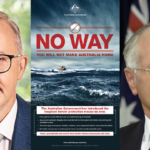“A Genuinely Appalling Trifecta of Cruelty”: Albanese Targets Refugees for Political Gain

The Albanese government jammed a trio of migration bills through federal parliament on the last sitting day of the year, which have implications for tens of thousands of refugees, asylum seekers and migrant communities. And taken together, these laws that swam through with bipartisan approval, mark the most serious crackdown on people from foreign lands in more than a decade.
Passed on 28 November, these bills facilitate the expansion of the offshore detention regime, the possibility of deporting people into danger, banning entire communities from entering this country, potential separation of families, the imprisonment of those who don’t comply with their deportation to the countries from which they fled, while further banning mobile phones from detention centres.
Indeed, with Donald Trump having been elected just weeks prior, the consideration that these laws have been influenced by the reemergence of the former US president and the extreme antiimmigration policies that he’s been spruiking for his next term in office is an easy one to make.
Greens immigration spokesperson David Shoebridge insists that these laws show Labor attempting to out cruel the Coalition, and he adds that when he consulted with Coalition senators about their support for the package of bills, he was told that the Liberal Nationals are more than happy to have such extreme measures on the books for their next term in office.
Federal Labor introduced new draconian antirefugee laws in early November, including the capacity to reverse refugee protection findings once made, while the three-bill package was compiled during the last sitting week of parliament, and just to highlight that Albanese was attempting strongman legislating tactics, he actually passed rights-eroding measures Labor voted down in 2020.
A long list awaiting deportation
“These three bills together amount to the biggest attack on multicultural Australia, migrants and people seeking asylum since the White Australia policy: a genuinely appalling trifecta of cruelty,” Senator Shoebridge told Sydney Criminal Lawyers.
“One part of the legislation empowers the Australian government to enter into a deportation agreement with literally any country on the planet regardless of their human rights record, regardless of whether they are a party to the Refugee Convention, to empower the immigration minister to deport people to that country unwillingly,” the senator continued.
These laws further enable the federal government to pay third countries to accept noncitizens being removed from this landmass.
During a 21 November parliamentary inquiry hearing into two of the bills, Shoebridge quizzed Home Affairs immigration compliance group manager Michael Thomas on whom the new laws might capture, and it turns out they have implications for over 80,000 people, including more than 75,000 unlawful noncitizens without visas, 4,500 bridging visas holders and about 1,000 in detention.
The Greens senator then highlighted that immigration minister Tony Burke had suggested these laws were in response to two recent High Court decisions, 2023’s NZYQ, which led to 246 indefinite detainees being released into the community, and 2024’s YBFZ, despite the reach of these laws being much broader.
“Labor tried to pretend that this legislation was to deal with a few hundred cases after two recent High Court decisions,” the senator underscored.
“But when I questioned Home Affairs about that on the very short hearing we had on two of the bills, they at least told the truth and made clear that more than 80,000 people are potentially impacted by this legislation.”
An ugly set of laws
Introduced into parliament on 7 November, the Migration Amendment Bill 2024 amended the Migration Act 1958 (Cth) to enhance “the removal from Australia of certain noncitizens who are on a removal pathway”, which means 80,000-odd noncitizens currently residing in Australia. And this legislation included laws to permit payments to be made to third countries to settle noncitizens.
The legislation has inserted a new definition of ‘removal pathway noncitizen’ into section 5 of the Migration Act, which involves noncitizens required to be removed from this country “as soon as reasonably practicable”, as well as a range of other noncitizens, who would be in that situation except for their being in possession of a bridging visa or the subject of a ministerial order.
The new bill further amended the law so that the minister can reverse refugee protection findings when they’ve been made in respect of removal pathway noncitizens, and it further ensures that ‘removal pathway’ bridging visas (Subclass 070) can be extinguished once a foreign country agrees to settle the holder of a specific visa.
Introduced on 21 November, the Migration Amendment (Prohibiting Items in Immigration Detention Facilities) Bill 2024 contains some measures Labor refused to pass when the Coalition put them to the vote in 2020. This included the banning of mobile phones for immigration detainees, which is a severe penalty, as it cuts off the lifeline to family, community and legal representatives.
Overall, this bill turns up the ability of Home Affairs and the Australian Border Force to prohibit, regulate and seize various items. The minister is able determine almost any item is a prohibited thing, and the bill cites mobile phones, SIM cards and devices that connect to the internet as examples.
These laws also facilitate the warrantless use of detector dogs and the application of strip searches in immigration detention centres to locate prohibited things in order to confiscate them.
The final piece of legislation was the Migration Amendment (Removal and Other Measures) Bill 2024. It was introduced in May this year. These laws too target removal pathway noncitizens, requiring them to comply with their removal, when they’ve exhausted all avenues in regard to remaining in this country, and if they fail to facilitate their own removal, then they can be imprisoned.
The minister has been empowered to give directions to noncitizens to do things to facilitate their removal and if they don’t comply, they can be charged with the offence of noncompliance with a removal pathway direction, contrary to section 199E of the Migration Act, which carries up to 3 years imprisonment and/or a $99,000 fine, along with a mandatory minimum 12 months prison sentence.
This final bill further provided the minister with the power to designate countries as ‘removal concern countries’, if they refuse to repatriate their nationals who sought asylum in Australia but were then refused protection. And when a foreign country does have this label applied, then all nationals from that country are barred from applying for any sort of visa to enter Australia.
Volume on cruelty set to get louder
“We have seen Labor try to out Dutton Dutton on immigration and refugees and present these three pieces of legislation that, in the words of Coalition members, produce such brutal laws that the Coalition could never have gotten them through parliament themselves,” Shoebridge made clear.
That’s exactly what happened when the Coalition did try to pass the mobile phone ban in immigration detention centres in September 2020, as the bill was voted down as a step too far. And it should be noted that those in immigration centres aren’t serving a prison sentence and nor do they require any punishment, as they’re being kept in detention for various administrative purposes.
Following the passing of the bills, Shoebridge paid a visit to Papua New Guinea last week to check on 60-odd asylum seekers that our nation has stranded in the capital of Port Moresby.
The Greens senator found that a recent deal the Albanese government cut with PNG to provide financial support for these dumped men, most of whom were detained in Manus Island detention centre in the past, is vastly inadequate.
And with the new laws opening up the potential for the fresh expansion of offshore detention, the Greens member is raising concerns that the government might be attempting to resolve the issue of the stranded men, in order to clear the path for new deportations to PNG.
“Labor is trying to outflank the Coalition to the right and that is a race they can never win,” Shoebridge maintained.
“My fear is over the next six months, the Coalition will now be saying every time anybody who is not an Australian citizen slightly steps out of line, ‘Why didn’t the government deport them?’”
“When are they going to set up their next Manus Island offshore detention centre? That is the politics that Labor has set up for the next six months and it is toxic for the country,” the senator ended.







